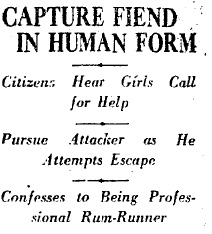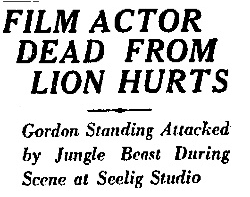 May 20, 1927
May 20, 1927
Lincoln Heights
Cinema actor Gordon Standing, of noble acting stock, had played Horatio in the “Modern Hamlet” on the East Coast stage. Back East he’d starred in Lasky, Vitagraph, Inspiration and D.W. Griffith film productions. But then he got it into his head to come Out West. Though he’d been wounded several times in the Marine Corps during the Big Scrap, nothing could have prepared him for the horrors of Hollywood.
At first, all was well at Selig Zoo Studio. Standing’d been working alongside his old buddy Elmo “First Tarzan” Lincoln and a new buddy, one giant lion, in the cheapie serial “King of the Jungle.” Apparently Standing had been getting along peachy-like with his new feline friend, until Standing changed his make-up, putting on a beard, and old Leo didn’t recognize him. The maned one attacked! It took fifteen men to pull the animal off Standing, who was rushed to Roosevelt Hospital with severe bites and slashes about the neck and shoulders. King of the Jungle was no match for King of the Beasts. (Interestingly, allmovie.com would have us believe Standing was trampled by a "rampaging elephant;" perhaps they were thinking of the elephants that graced the entrance to the zoo.)
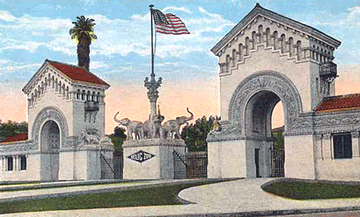
The Selig Studio had a "jungle area" in which to film, but their lions weren’t of the perfoming type; the question stands, then, was the rent-a-lion that killed Standing none other than famous snarling L. B. Mayer sidekick Slats, denizen of Gay’s Lion Farm (where lions would run amok a mere sixteen months later)?
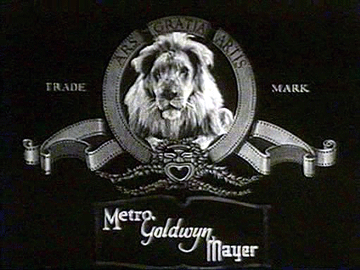
RRRRAARRRRR!!!!!

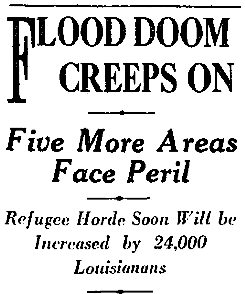

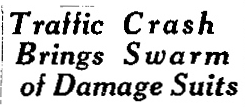
 May 19, 1927
May 19, 1927
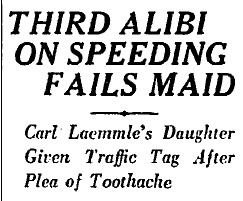 Rosabelle Laemmle, only daughter of Carl Sr., was arrested for speeding in Beverly Hills today. When Officer McBane asked where she was headed in such a big hurry on this Saturday night, she replied, "To the dentist." Unfortunately for Rosabelle, she’d already used that excuse on McBane twice before. Tired of playing the chump, McBane said, "I advise you to have all your teeth pulled out and to present this speeding ticket to Justice of the Peace Etrelinger on the 23rd."
Rosabelle Laemmle, only daughter of Carl Sr., was arrested for speeding in Beverly Hills today. When Officer McBane asked where she was headed in such a big hurry on this Saturday night, she replied, "To the dentist." Unfortunately for Rosabelle, she’d already used that excuse on McBane twice before. Tired of playing the chump, McBane said, "I advise you to have all your teeth pulled out and to present this speeding ticket to Justice of the Peace Etrelinger on the 23rd."

